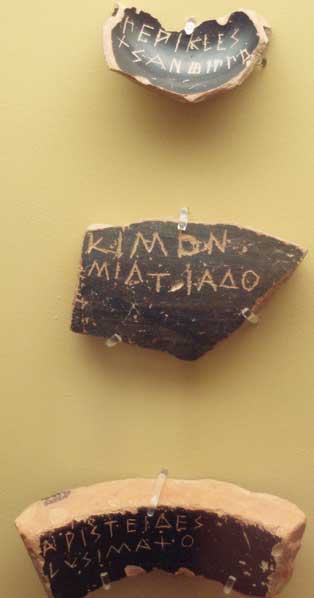|
|

Aristides Ostrakon

Ostraka (). Further, the elite Athenians who suffered ostracism were rich and/or noble men who had connections (xenoi) in the wider Greek world and who, unlike genuine exiles, were able to access their income in Attica from abroad. In Plutarch, following as he does the anti-democratic line common in elite sources, the fact that people might be recalled early seems like yet another example of the inconstancy of mob-rule. However, that automatic figure of ten years was probably often more than enough to bring off whatever had been sought by the expulsion. As ostracism was simply a pragmatic measure, notions like 'serving out the full sentence' do not apply. To repeat: it was not a penalty.
One curious window on the practice is the cache of 190 ostraka discovered dumped in a well next to the acropolis. From the handwriting they appear to have been written by 14 individuals and bear the name
From
- A list, differing slightly from that given above, of known ostracisms and many of the key Greek passages translated, from John Paul Adams's site at CSU Northridge.
Note that the ancient sources on ostracism are mostly 4th century or much later and often limited to brief descriptions such as notes by lexicographers. Most of the narrative and analytical passages of any length come from Plutarch writing five centuries later and with little sympathy for democratic practices. There are no contemporary accounts that can take one into the experiences of participants: a dense account of Athenian democracy can only be made on the basis of the much fuller sources available in the 4th century (especially the Attic orators) after ostracism had fallen into disuse. We are largely dealing with a 4th-century memory of the institution.
- Oxford Classical Dictionary, 2nd edition(Oxford 1996): ostracism
- Ostraka, Mabel Lang (Athens 1990)
- Ostracism at Athens, Eugene Vanderpool (Cincinnati 1970)
- The Origins of Ostracism, A Synthesis, Rudi Thomsen (Copenhagen 1972)
- 'The Ostracism of Hyberbolus', J.P. Rhodes, in Ritual, Finance, Politics: Athenian Democratic Accounts presented to David Lewis, edd. R. Osborne, S. Hornblower (Oxford 1994), p. 85-99
- The Athenian Democracy in the age of Demosthenes, Mogens Herman Hansen (Oxford 1987)
- Mass and Elite in Democratic Athens: Rhetoric , Ideology and the Power of the People, Josiah Ober (Princeton 1989)
Retrieved from "http://en.wikipedia.org/"
All text is available under the terms of the GNU Free Documentation License
|
Ancient Greece
|
Medieval Greece / Byzantine Empire
|
Modern Greece
|
|
Science, Technology , Medicine , Warfare
, Biographies , Life , Cities/Places/Maps , Arts , Literature , Philosophy ,Olympics, Mythology , History , Images
|
Science, Technology, Arts
, Warfare , Literature, Biographies
Icons, History
|
Cities, Islands, Regions, Fauna/Flora ,
Biographies , History , Warfare
Science/Technology, Literature, Music , Arts , Film/Actors , Sport , Fashion
|

|
|
|



